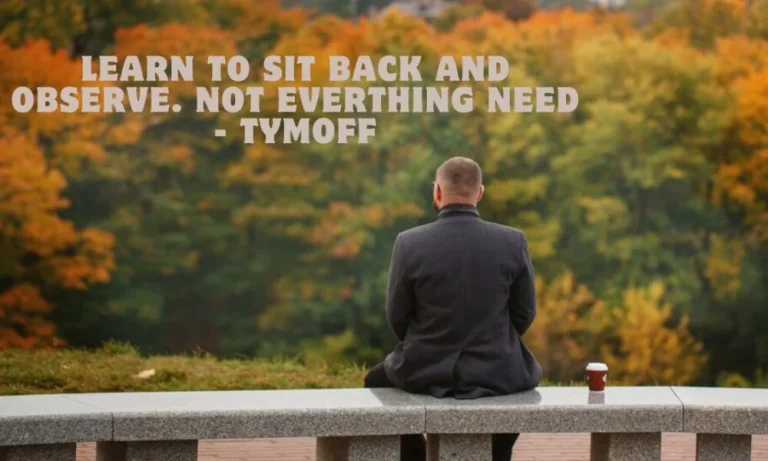In our fast-paced world, it’s easy to feel the pressure to constantly engage, react, and intervene. Yet, there’s immense value in learning to sit back and observe. This practice encourages us to pause, reflect, and appreciate the moment without the compulsion to act. By embracing this mindset, we can cultivate mindfulness, enhance our understanding of situations, and foster deeper connections with ourselves and others. Not everything demands an immediate response; sometimes, the most profound insights arise from simply taking a step back and watching the world unfold.
In an age where the pressure to be constantly engaged, active, and involved is omnipresent, the idea of sitting back and observing might seem counterintuitive. We often feel a sense of urgency to react to every situation, offer advice, provide solutions, or intervene in every conversation or challenge. However, one of the most valuable skills you can develop in today’s fast-paced world is learning to take a step back and observe. Only some things need your immediate attention, and only some moments demand your input.
The Power of Observation
Observation is more than passive watching—it is an active, intentional practice that allows you to understand the dynamics of a situation more fully. It provides you with the clarity to discern what is truly important, what requires action, and what can be left to unfold naturally. By learning to sit back, you give yourself the opportunity to gain insight, identify patterns, and avoid unnecessary stress that often comes with the urge to always be “on.”
Understanding the Limits of Your Influence
Not everything in life can or should be controlled. The world is full of unpredictability, and often, we feel compelled to influence outcomes because we want to feel important, relevant, or in control. However, many situations do not require intervention and can resolve themselves with time. By stepping back, you allow others to solve their problems, learn from their mistakes, and grow. Your non-interference can sometimes be the most potent form of support.
Resisting the Urge to “Fix” Everything
For some, there’s an inherent desire to “fix” every problem that arises. This might stem from a deep-seated need to be helpful or a belief that your input is always necessary. However, not everything needs to be fixed, especially if it is not your problem to solve. By constantly jumping in with advice or solutions, you may be overstepping boundaries or undermining others’ ability to handle their challenges. The ability to observe allows people to find their solutions, which can often be more empowering and long-lasting than any advice you might offer.
Creating Mental Space
When you refrain from constantly intervening, engaging in debates, or feeling the need to respond to every situation, you create space in your mind. This mental space is crucial for your overall well-being. Constant engagement can lead to burnout, stress, and a sense of being overwhelmed. Sitting back and observing gives your mind the time to process, reflect, and rejuvenate.
Enhancing Emotional Intelligence
The more you observe, the more you become attuned to the nuances of human behavior, interactions, and emotions. You start to notice how people communicate, what their body language says, and how they respond to different stimuli. This heightened awareness can significantly boost your emotional intelligence (EQ), helping you understand not just the facts of a situation but also the emotional landscape. In turn, this can make you more empathetic and better equipped to handle interpersonal relationships.
Learning from Silence
Sometimes, silence speaks louder than words. When you choose to sit back, you give yourself the space to reflect and absorb information without feeling the pressure to constantly contribute. In many situations, silence allows others to share more, express themselves more freely, and even reflect on their thoughts. It’s a powerful tool for learning and understanding the bigger picture.
When to Speak Up and When to Stay Silent
While learning to observe is a valuable skill, it’s also essential to know when it is appropriate to speak up or take action. Being passive all the time can be detrimental, especially if you are in a position of responsibility or influence where your voice is needed. The key is balance—learning when to step back and when to step in.
- When to speak up: Speak up when your insight can genuinely make a difference, when your perspective adds value, or when your intervention is necessary to ensure the safety or well-being of others.
- When to sit back: Sit back when a situation is outside your control, when your input is not needed, or when you recognize that someone else is better suited to handle it. Sometimes, offering advice too soon can hinder growth or prevent others from learning through their own experiences.
The Art of Letting Go
Letting go of the need to always be involved can be liberating. It allows you to conserve energy for the things that truly matter and gives you the freedom to engage with life more mindfully and intentionally. You don’t need to solve every problem or answer every question. By learning to sit back and observe, you invite a sense of calm and presence into your life that can be hard to find in our over-stimulated world.
Practicing the Art of Observation
The ability to step back and observe is not always natural, especially in environments that demand constant productivity, instant responses, and an always-on mentality. However, like any skill, learning to observe rather than react is something that can be cultivated with intention and practice. Here are some strategies to help you develop this skill:
1. Mindfulness and Presence
Mindfulness is the practice of being fully present in the moment without judgment or distraction. It encourages you to step away from the constant cycle of thinking and reacting and focus on the present experience. By being mindful, you become better equipped to observe without feeling the pressure to intervene immediately. Whether you’re sitting in a meeting, talking with a friend, or simply observing your environment, mindfulness helps you remain present without the impulse to react or “fix” things.
- How to practice: Engage in simple mindfulness exercises such as deep breathing, focusing on your senses (sight, sound, touch), or practicing meditation. These techniques will train your mind to stay focused on the present, allowing you to observe without jumping to conclusions or responses.
2. Developing Patience
Often, the impulse to act or speak comes from impatience. You may feel that you need to provide input because you’re uncomfortable with silence or inaction, or because you believe there’s an immediate need for resolution. Learning to be patient—both with others and with yourself—can help you develop the ability to observe more deeply.
- How to practice: Practice sitting in silence for a few minutes each day without the urge to check your phone, speak, or fill the space with noise. When in conversations, resist the temptation to interrupt or immediately give advice. Allow the other person the time and space to express themselves fully.
3. Ask Open-Ended Questions
In situations where you feel the urge to intervene, try instead to ask open-ended questions. This approach can help you stay engaged and aware without taking control of the conversation or offering premature solutions. Asking questions like “What do you think should happen next?” or “How do you feel about this?” can encourage others to reflect, articulate their thoughts, and take ownership of the situation.
- How to practice: Shift from offering advice to being a sounding board. Instead of jumping in with a solution, ask questions that help the other person think critically. This way, you allow the conversation to unfold naturally, giving everyone involved the space to reflect and make decisions.
4. Learn to Trust the Process
Trusting that things will unfold in their own time and that people will handle challenges in their own way is a critical part of the observation process. It requires a belief that not everything needs to be solved immediately, and that sometimes the best course of action is to let things evolve organically.
- How to practice: When a problem arises, instead of rushing to fix it, step back and ask yourself: “What will happen if I don’t intervene?” Trust that things may improve on their own or that others will rise to the occasion. You may find that the natural process of problem-solving is more effective than you initially thought.
5. Reframe Your Thinking
Part of the challenge in learning to observe is breaking free from the belief that you have to be always doing something. Reframe this mindset by seeing observation as a form of engagement, one that requires focus, awareness, and insight. It can be just as powerful, if not more so, than constant action. Recognize that observation is a form of participation—it’s not about being passive but rather being fully attuned to the present moment.
- How to practice: When faced with a situation where you would normally feel compelled to act, remind yourself that you can still be deeply involved without physically intervening. Reframe the situation by seeing it as a chance to observe, learn, and gain perspective.
May you also like it:
Understand Fashionisk .com Every think you need to know
Discover www.blueflamepublishing.net
Explore Geekzilla.tech Honor Magic 5 Pro
The Benefits of Sitting Back and Observing

While this skill may not yield immediate, tangible results like other forms of action, the benefits of sitting back and observing can have a profound impact over time. Here are a few long-term benefits that come with this practice:
1. Improved Decision Making
When you take the time to observe, you gain a clearer understanding of the dynamics at play in any given situation. This leads to better-informed decisions because you’ve allowed yourself to see the full picture, rather than rushing in with incomplete or biased information. Observation helps you avoid knee-jerk reactions and allows you to respond with greater thoughtfulness.
2. Stronger Relationships
By learning to observe, you’ll begin to notice subtleties in others’ behavior—how they communicate, what they need, and how they react under different circumstances. This heightened awareness can deepen your emotional connection with others because you’ll be able to respond more thoughtfully to their needs and communicate in ways that resonate with them.
3. Greater Emotional Resilience
When you stop reacting to every little thing and start observing, you develop emotional resilience. You learn that not everything requires your intervention or your emotional energy. You stop getting swept up in every crisis or challenge and instead develop a sense of emotional balance and stability.
4. Better Leadership
In leadership, the ability to step back and observe is a crucial skill. Rather than micromanaging or rushing to provide solutions, great leaders recognize when to step aside and let others take the lead. This not only empowers others but also fosters a collaborative environment where team members feel trusted and valued.
5. Reduced Stress and Burnout
When you learn to let go of the need to control or fix everything, you naturally reduce the stress and pressure that comes with it. Observing rather than acting can be liberating—it frees up mental and emotional energy that can be redirected toward things that truly matter. This can lead to a reduction in feelings of burnout and overwhelm.
Frequently Asked Questions
What does it mean to “sit back and observe”?
“Sit back and observe” refers to the practice of pausing and watching a situation unfold without feeling the need to immediately react or intervene. It encourages mindfulness and reflection.
Why is it essential to observe rather than react?
Observing allows us to gain a clearer understanding of a situation, reducing impulsive decisions. It can lead to better judgment and more thoughtful responses, fostering a sense of calm and clarity.
How can I practice this skill in my daily life?
Start by setting aside a few minutes each day to observe your surroundings, thoughts, or emotions without judgment. Gradually, you can apply this practice in social situations, decision-making processes, or stressful moments.
What benefits can I expect from learning to observe?
Practicing observation can enhance your mindfulness, improve emotional regulation, reduce stress, and lead to deeper insights about yourself and your relationships.
Can this practice help in my professional life?
Absolutely! By taking a step back in professional settings, you can better assess team dynamics, understand client needs, and make more informed decisions, ultimately improving your effectiveness and leadership skills.
Are there any challenges to this practice?
Yes, it can be challenging to resist the urge to react, especially in emotionally charged situations. It requires patience and practice, but the rewards are often worth the effort.
How long does it take to see the benefits?
The timeline can vary for each person. Some may notice immediate benefits, while for others, it may take consistent practice over weeks or months to fully appreciate the changes in mindset and behavior.
Can this approach be integrated with other mindfulness practices?
Definitely! “Sitting back and observing” complements other mindfulness techniques, such as meditation, deep breathing, and journaling, enhancing your overall mindfulness practice.
Conclusion
In a culture that glorifies constant action and involvement, learning to sit back and observe can be an incredibly freeing and beneficial practice. It allows you to gain a deeper understanding of yourself, the people around you, and the situations you encounter. You don’t always need to be “on” or be the one to provide answers. Sometimes, stepping back is the best form of wisdom you can offer. By learning to observe rather than engage in every moment, you not only conserve your energy but also open the door to greater clarity, empathy, and emotional intelligence.

